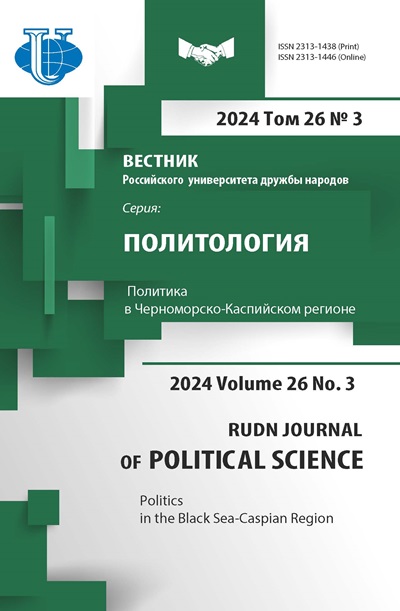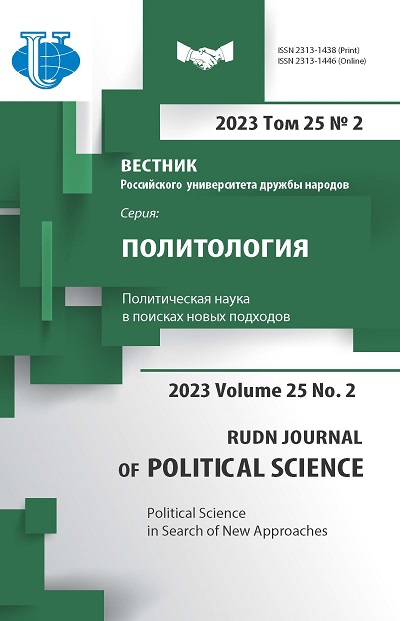Cancel culture towards Russia and how to deal with it
- Authors: Rustamova L.R.1,2, Ivanova D.G.1
-
Affiliations:
- Moscow State Institute of International Relations (University) of the Ministry of Foreign Affairs of the Russian Federation
- The Diplomatic Academy of the Ministry of Foreign Affairs of Russia
- Issue: Vol 25, No 2 (2023): Political Science in Search of New Approaches
- Pages: 434-444
- Section: SOCIOCULTURAL FOUNDATIONS OF POLITICS
- URL: https://journals.rudn.ru/political-science/article/view/35160
- DOI: https://doi.org/10.22363/2313-1438-2023-25-2-434-444
- EDN: https://elibrary.ru/PNFYRX
Cite item
Full Text
Abstract
Cancel Culture originated in Western society and was initially interpreted as a social phenomenon, but over time it began to acquire an increasing political dimension. Its main distribution platform are social networks, where, due to the almost instantaneous reaction on the part of society to information stuffing, the “cancellation culture” has become truly global. Since 2022 cancel culture is a tool for managing socio-political phenomena that can be used for foreign policy purposes. The authors make an attempt to conceptualize and operationalize this term, formerly used in publicjournalistic discourse. They also set themselves the task of identifying the subjects of dissemination of cancel culture and suggesting mechanisms to combat its negative manifestations.
About the authors
Leyli R. Rustamova
Moscow State Institute of International Relations (University) of the Ministry of Foreign Affairs of the Russian Federation; The Diplomatic Academy of the Ministry of Foreign Affairs of Russia
Author for correspondence.
Email: leili-rustamova@yandex.ru
ORCID iD: 0000-0001-9803-9904
Ph.D. (Political Sci.), Associate Professor at the World Politics Department, MGIMO-University; Senior Researcher at the Institute of Current International Problems of the Diplomatic Academy of the Russian Foreign Ministry
Moscow, Russian FederationDaria G. Ivanova
Moscow State Institute of International Relations (University) of the Ministry of Foreign Affairs of the Russian Federation
Email: ivanovadashamgimo@mail.ru
ORCID iD: 0009-0006-0082-3711
Masters Student
Moscow, Russian FederationReferences
- Bouvier, G., & Machin, D. (2021). What gets lost in Twitter “cancel culture” hashtags? Calling out racists reveals some limitations of social justice campaigns. Discourse & Society, № 32 (3), 307–327. https://doi.org/10.1177/0957926520977215.
- Clark, M. (2020). DRAG THEM: A brief etymology of so-called “cancel culture”. Communication and the Public, № 5 (3–4), 88–92. https://doi.org/10.1177/2057047320961562.
- Cook, C.L., Patel, A., Guisihan, M. et al. (2021). Whose agenda is it anyway: an exploration of cancel and political affiliation in the United States. SN Social Sciences, (1), 237. https://doi.org/10.1007/s43545-021-00241-3.
- Geusens, F., Ouvrein, G., & Remen, S. (2023). #Cancelled: A qualitative content analysis of cancel culture in the YouTube beauty community. The Social Science Journal. https://doi.org/10.1080/03623319.2023.2175150
- Habermas, J. (1962). The structural transformation of the public sphere: An inquiry into a category of bourgeois society. Herman Lutcherhand Verlag, Darmstad and Neuwid, Federal Republic of Germany. 328 p.
- Lorde, A. (1984). Uses of anger: Women responding to racism. Crossing. (Ed.), Sister outsider: Essays & speeches, 124–133.
- Mueller, Th.S. (2021). Blame, then shame? Psychological predictors in cancel culture behavior. The Social Science Journal, 1–14. https://doi.org/10.1080/03623319.2021.1949552
- Noelle-Neumann, E. (1974). The Spiral of Silence: A Theory of Public Opinion. Journal of Communication, (24), 43–51. https://doi.org/10.1111/j.1460-2466.1974.tb00367.x.
- Norris, P. (2020). Closed Minds? Is a “Cancel Culture” Stifling Academic Freedom and Intellectual Debate in Political Science? HKS Faculty Research Working Paper, Series RWP20-025, 5 August. 29 p.
- Pilon, J.G. (2020). America and the Cancel Culture of Fools. Israel Journal of Foreign Affairs, 1–14. https://doi.org/10.1080/23739770.2020.1815365.
- Saldanha, N., Mulye, R., & Rahman, K. (2022). Cancel culture and the consumer: A strategic marketing perspective. Journal of Strategic Marketing. https://doi.org/10.1080/0965254X.2022.2040577.
- Velasco, J.Ch. (2020). You are Cancelled: Virtual Collective Consciousness and the Emergence of Cancel Culture as Ideological Purging. Rupkatha Journal on Interdisciplinary Studies in Humanities. Special Conference Issue, 12(5), 1–7. https://doi.org/10.21659/rupkatha.v12n5. rioc1s21n2.
- Walker Ch., & Ludwig, J. (2017). The Meaning of Sharp Power. How Authoritarian States Project Influence. Foreign Affairs, 2017, November 16. Retrieved March 16, 2023, from https://www.foreignaffairs.com/articles/china/2017-11-16/meaning-sharp-power
- Whipple, K. (2023). Contextualizing the Art and the Artist: How U.S. Arts and Culture Journalists Perceive the Impact of Cancel Culture Practices and Discourses. Journalism Practice. https://doi.org/10.1080/17512786.2023.2180653
















